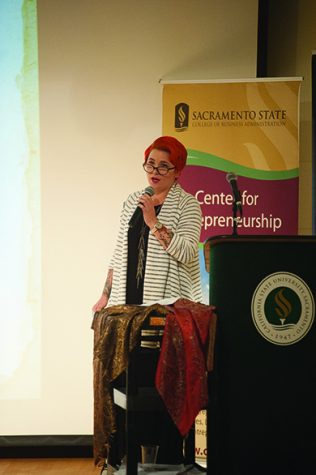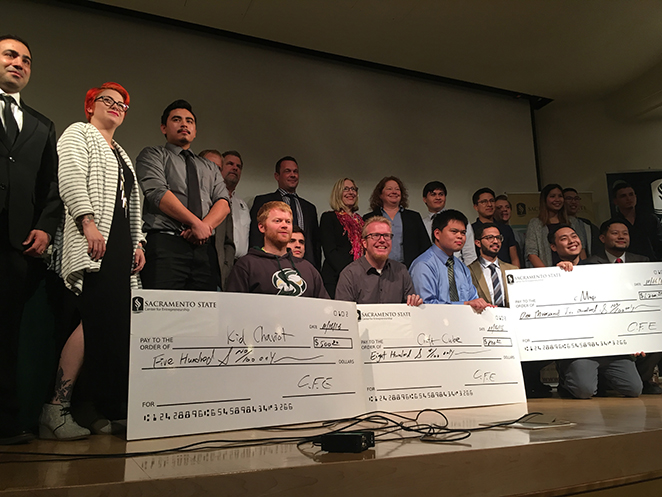Applause rang through the Hinde Auditorium on Wednesday as the winners of “The Pitch” competition — Senator Chao and Choy Saechao — went on stage to collect a $1,200 prize for their college campus navigation app venture, cMaps.
“I feel elated, you know,” Chao said, holding his giant check after the ceremony. “It’s a dream come true … It’s just really a surreal moment for me. It’s crazy.”
(Story continues below)
https://twitter.com/ss_horo/status/799114737871007745
cMaps is a proposed micro navigation app for campuses and would include features such as connection to Sacramento State’s Student Center to view class schedules, step-by-step instructions to classes, official reporting for crimes and incidents, parking information and map updates due to new construction.
Micro navigation is navigation focused on the fine details of terrain, such as grass or pavement.
“Think of Snapchat and Pokemon Go, but with transparent GPS indicators — all directing you through your cell phones’ cameras,” Chao said on-stage.
cMaps would also take multi-story buildings such as the Union into consideration, making it attractive to potential buyers such as Google, according to Saechao.
“There’s a second floor (of the Union), we can’t just say ‘go here’ — we have to tell the user it is upstairs,” Saechao explained. “Google does not have a GPS where you know how high you’re at. So if you use Google Maps, if you drive under and overpass, all of a sudden they think you’re up (there), and they’re telling you to go this way now, because they don’t know where you are.”
Currently, Google Maps navigation offers turn-by-turn directions and lane guidance, traffic avoidance and alternate routes, business reviews and street view.
Chao said he and Saechao plan to release a beta version of cMaps to students and faculty in fall 2017, and hope to expand cMaps services into high schools and businesses.
“I want it to be dedicated to Sac State students because I’m going to Sac State,” Chao said. “Maybe in the future, all colleges can use it and we can use it outside of school instead of using Google Maps.”
“Other colleges, like MIT and Harvard, they have all these technologies out there — they’re at the forefront,” Saechao added.
“But if Sac State pilots this, Sac State can say ‘We invented micro navigation that Google uses now, because they bought it from us.’ ”
(Story continues below)
https://twitter.com/ss_horo/status/799120330224611328
Runner-ups in The Pitch were Craft Cube, pitched by electrical and electronic engineering majors Ammar Ahmed, Thomas Bock, Michael Golez and Tan Hua and Kid Chariot Link by business administration major Shaun Robinson, which received second and third places, respectively.
Craft Cube is a low-cost and easy-to-use combination of a 3D printer, a laser cutter and milling to produce a product for hobbyists, educators, small businesses and artists.
“The first main problem is that the machines sold out there — they’re expensive,” Ahmed explained. “The second problem is the complexity of operating this machine — in other words, they are not user-friendly. The third problem is that most of them are sold as a closed-source system. All of these come as a hassle to customers. So I thought about developing a product that would address all these issues and add more features to make our product more user-friendly.”
Craft Cube also has an adjustable size, camera feature, touch screen, Wi-Fi, phone app, and is open source, meaning that its code is available for a community to view and use.
Kid Chariot Link was developed after Robinson found that baby strollers were uncomfortable to push while jogging. The Kid Chariot Link uses a harness and a frame connected to a bicycle trailer, which would allow for proper and more comfortable running form.
“So essentially, we’re the horse in a chariot for the child,” Robinson explained.
(Story continues below)

While Robinson admitted that his venture cannot be patented and can be picked up by another company and copied, he said he believes he can profit from 12 to 24 months of sales.
The winners of The Pitch will go on to represent Sac State in the national Future Four & More Business Competition.
Other proposed ventures from The Pitch include a website that allows users to virtually try on clothes before buying, a drone that can track bank robbery suspects and environmentally-conscious clothing made by the homeless.
The competition was judged by Mark Haney of Haney Business Ventures; Josh Heart, a regional area manager of Wells Fargo and board member of WAR Inc.; Stacey Powell, a personal finance coach for Finance Gym; and Virginia Varela, president and CEO of the Golden Pacific Bancorp, Inc.


























































































































